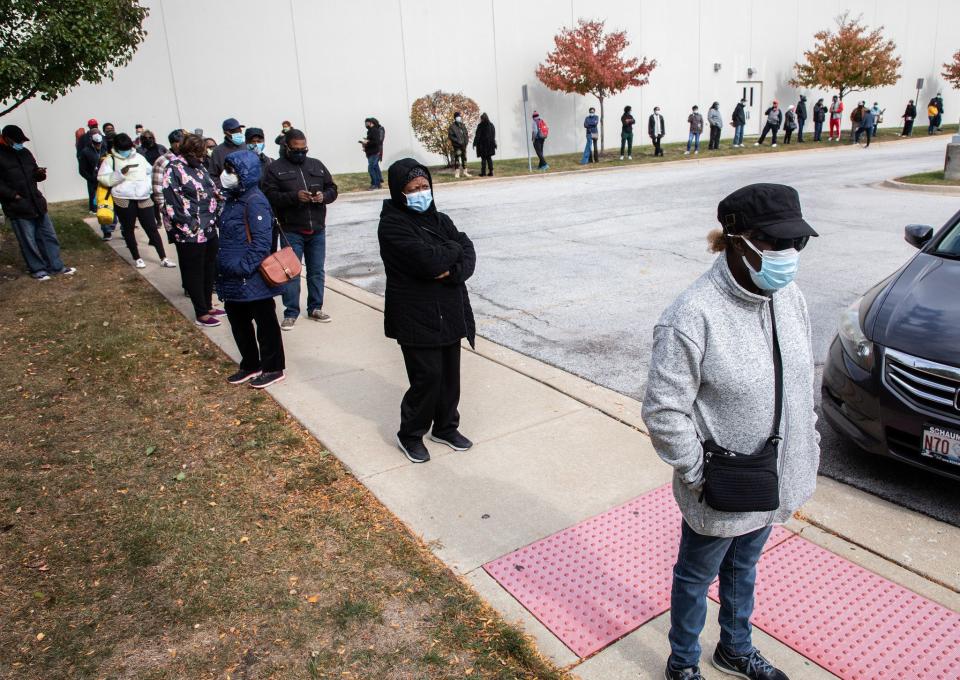Column: This election isn’t just about Donald Trump and Congress. Pay attention to those judges on the ballot too.
Judges have it made. Once they are elected in Illinois, it is almost impossible to get them off the bench, regardless of how awful they might be.
Though Cook County Circuit Court judges are responsible for overseeing courtrooms where guilt or innocence is decided as well as interpreting laws that affect all of us, they receive the least amount of consideration by voters of anyone on the ballot.
That’s because many people don’t spend the time necessary to educate themselves before going to the polls to vote on whether judges should be retained or not.
County judges are elected to a six-year term, and after that must receive 60% “yes” votes in order to retain their position. In the past 46 years, only 29 judges in Illinois have failed to be retained.
Perhaps it’s because there are so many of them on the ballot. Rather than doing our homework, some people leave the entire section blank, vote no on all of them or blindly follow the recommendations of news organizations or lawyers groups.
But we cannot afford to do that this year.
Every decision in 2020, from the president to the graduated-rate income tax amendment, seems more crucial to our democracy that ever before. In the era of Black Lives Matter, police misconduct and social justice reform, competent judges are major components.
We must make sure that we have jurists who are guided by the law and are committed to ensuring that every defendant receives fair and equitable treatment.
I spent hours at my computer recently poring through judicial sites, newspaper endorsements and news articles trying to find out exactly who the 60 Circuit Court judges and two Appellate Court judges on my ballot were.
Some of the most popular sources are Injustice Watch, the Chicago Council of Lawyers and the Illinois Bar Association. But even if they deem a judge qualified or recommend retention, it doesn’t mean we should automatically vote yes. And a negative rating doesn’t always mean we should vote no.
That’s when our research skills have to kick in. I voted no for 17 of the 62 judges.
Some, such as Judge Kenneth Wadas, should be a no-brainer. His decisions have been reversed on appeal 25 times in the past six years, more than any criminal court judge on the ballot.
Wadas never should have been elected to the Circuit Court in 1996. As a prosecutor in 1983, the Illinois Appellate Court called Wadas’ conduct “an insult to the court and to the dignity of the trial bar.”
In 1999, a defendant was convicted of attacking a woman at a bus stop with a box cutter after Wadas refused to allow evidence that another man had confessed to five similar attacks in the same areas two weeks after the defendant was arrested. The defendant spent nearly 10 years in prison before he was finally exonerated.
In 2004, Wadas sentenced a juvenile to 100 years in prison for a murder he committed when he was 16. An appeals court ordered the sentence reduced because of his age.
Judge Thomas Byrne denied certificates of innocence to two men who spent decades in prison for crimes they confessed to after being tortured by detectives under the command of the notorious police Cmdr. Jon Burge.
Judge Kerry Kennedy once threatened a woman with contempt of court if she would not watch a video of her alleged rape. Sexual assault advocates forced him to back down.
Others, including Judge Michael Toomin, who heads the juvenile justice division, are more nuanced.
Toomin insists that the Democratic Party refused to endorse him as retaliation for appointing a special prosecutor to investigate Cook County State’s Attorney Kim Foxx’s handling of the Jussie Smollett case.
But some question Toomin’s commitment to judicial reform. He opposed a program that would provide alternatives to incarcerating juveniles and made it difficult for juveniles to be released from detention during the coronavirus outbreak, according to Injustice Watch.
Judge Jackie Portman-Brown was placed on administrative duty after she was seen on video locking a 6-year-old relative in a holding cell for a brief period. While some have praised her tough demeanor on the bench, others have criticized her for being a bully. She has said the incident with her grandniece was misrepresented.
Judge Megan Goldish, a former prosecutor, is accused in a lawsuit of helping to convict a teenager in 2002 based on witness statements that were allegedly false and coerced by police, according to Injustice Watch. She has denied any wrongdoing.
Two judges shouldn’t be on the ballot. Judge Mauricio Araujo resigned from the bench this month after the Illinois Courts Commission found evidence that he had harassed women. Judge Patricia Martin plans to retire as presiding judge of the child protection division in December.
For some voters, the decision might have more to do with a judge’s previous life than his time on the bench. Voters with long memories might recall that prior to becoming a judge, Daniel Kubasiak managed Alderman Ed Vrdolyak’s failed racially charged campaign to unseat Mayor Harold Washington in 1987.
For most voters, the decision about judges will come down to how strongly we feel about maintaining the integrity of our judicial system. We will be guided by our individual views on what is right and what is wrong in our society.
Inevitably, our vote will reflect our feelings about justice. But we don’t need judges who see their jobs the way we do. They must put their personal and political agendas aside and follow the law.
Twitter @dahleeng
———
©2020 the Chicago Tribune
Visit the Chicago Tribune at www.chicagotribune.com
Distributed by Tribune Content Agency, LLC.









